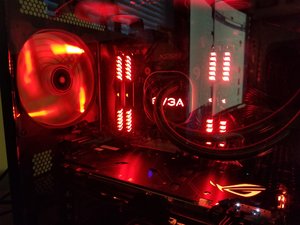jhatfie
[H]ard|Gawd
- Joined
- Mar 19, 2003
- Messages
- 1,636
I have been running my 7820X with my Cooler Master Glacer 240L which also served duty with my since retired 5820k. The 7820X has been a beast to cool, but running at 4.6Ghz @ 1.15v with a AVX offset of -3, it has been pretty manageable. However I was curious how a updated AIO would compare, so I picked up a EVGA CLC 280.
I may put in some more details later, but I took some tests running OCCT and Intel Extreme Tuning Utility for comparison data. Tests were just 15 minutes, so not long, but enough to build up some heat and get an idea. Fan were locked at 90%, which was pretty loud tbh. I should have taken some more readings at 50% fan as that is very tolerable and max temps seem to be only slightly higher. Temps below are max peak temp recorded.
CM Glacer 240L max temp
OCCT
4.6ghz @ 1.15 - 77C
4.7ghz @ 1.20 - 83C
IETU
4.6ghz @ 1.15 - 73C
4.7ghz @ 1.20 - 80C
EVGA CLC 280 max temp
OCCT
4.6ghz @ 1.15 - 71C
4.7ghz @ 1.20 - 73C
IETU
4.6ghz @ 1.15 - 70C
4.7ghz @ 1.20 - 72C
4.7ghz @ 1.20 - 75C (50% fan)
4.9Ghz @ 1.25 - 81C
I am not sure if it is normal for temps to deteriorate over time with a AIO, but I fully expected the old Glacer to put up more of a fight and be closer. Maybe something was up with it since it had been in service for a while, or maybe I had a bad mount, but regardless I did find it interesting that 4.9Ghz @ 1.25v on the EVGA was essentially the same peak temps as 4.7Ghz @ 1.20v on the 240L.

I may put in some more details later, but I took some tests running OCCT and Intel Extreme Tuning Utility for comparison data. Tests were just 15 minutes, so not long, but enough to build up some heat and get an idea. Fan were locked at 90%, which was pretty loud tbh. I should have taken some more readings at 50% fan as that is very tolerable and max temps seem to be only slightly higher. Temps below are max peak temp recorded.
CM Glacer 240L max temp
OCCT
4.6ghz @ 1.15 - 77C
4.7ghz @ 1.20 - 83C
IETU
4.6ghz @ 1.15 - 73C
4.7ghz @ 1.20 - 80C
EVGA CLC 280 max temp
OCCT
4.6ghz @ 1.15 - 71C
4.7ghz @ 1.20 - 73C
IETU
4.6ghz @ 1.15 - 70C
4.7ghz @ 1.20 - 72C
4.7ghz @ 1.20 - 75C (50% fan)
4.9Ghz @ 1.25 - 81C
I am not sure if it is normal for temps to deteriorate over time with a AIO, but I fully expected the old Glacer to put up more of a fight and be closer. Maybe something was up with it since it had been in service for a while, or maybe I had a bad mount, but regardless I did find it interesting that 4.9Ghz @ 1.25v on the EVGA was essentially the same peak temps as 4.7Ghz @ 1.20v on the 240L.

Last edited:
![[H]ard|Forum](/styles/hardforum/xenforo/logo_dark.png)